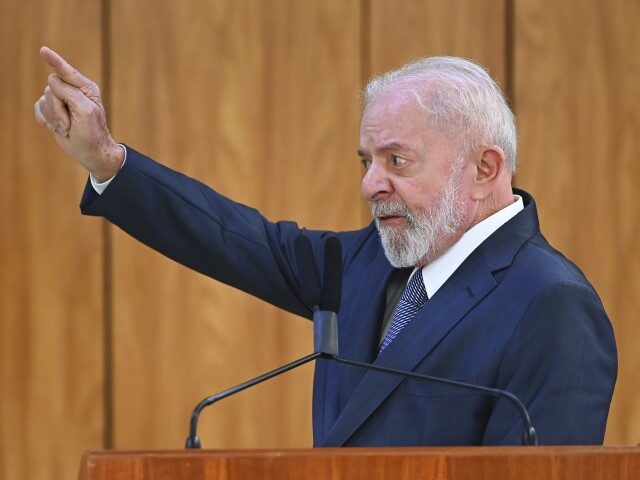The Venezuelan socialist regime accused Brazil on Thursday of engaging in an “aggression” against the country by blocking its admission into the BRICS anti-U.S. bloc.
Dictator Nicolás Maduro traveled to Kazan, Russia, this week to participate in this year’s annual BRICS summit, hosted by Russian strongman Vladimir Putin. The Venezuelan dictator hoped that BRICS would grant a spot to Venezuela in the group, either as a member or as one of a new set of “partner” nations — a goal Maduro has spent the majority of the past decade attempting to attain to no avail.
BRICS member states agreed to extend invitations as “partners” to 13 new countries this week: Turkey, Indonesia, Algeria, Belarus, Cuba, Bolivia, Malaysia, Uzbekistan, Kazakhstan, Thailand, Vietnam, Nigeria, and Uganda.
The 13 countries would not join as full members of the bloc, but rather as “partner states” and not as full members of the organization. BRICS did not extend an invitation to Venezuela to become a “partner,” despite Russia and China’s publicly favorable stance on the matter. Maduro appeared to cope with getting snubbed by claiming on Thursday that Venezuela has been part of the group “for the past 200 years.” (BRICS was founded in 2009).
The decision to leave Venezuela out of the list was allegedly at the request of Brazil, according to reports in Brazilian media. The reports claimed that Brazilian far-left President Luiz Inácio Lula da Silva — a longstanding ally of the Venezuelan socialist regime — is at odds with Maduro since the aftermath of Venezuela’s fraudulent July 28 presidential election and the Venezuelan authorities’ continued refusal to publish voter data that can substantiate Maduro’s claimed “victory.”
The Maduro regime, after leaving the summit empty-handed, issued a statement through its Foreign Ministry on Thursday accusing Brazil of using a “veto,” allegedly initially set in place by former conservative President Jair Bolsonaro, on Venezuela that prevents the country from joining BRICS. Bolsonaro left office at the start of 2023 and has no say in Lula’s foreign policy.
“Through an action that contradicts the nature and postulate of the BRICS, the representation of the Brazilian Foreign Ministry (Itamaraty), led by Ambassador Eduardo Paes Saboia, decided to maintain the veto that Bolsonaro applied to Venezuela for years,” the Foreign Ministry claimed, “reproducing hatred, exclusion and intolerance promoted from the Western centers of power to prevent, for now, the entry of the Homeland of Bolivar to this organization.”
“The Venezuelan people feel indignation and shame for this inexplicable and immoral aggression of the Brazilian Foreign Ministry (Itamaraty),” it continued, “maintaining the worst of Jair Bolsonaro’s policies against the Bolivarian Revolution founded by Commander Hugo Chávez.”
Celso Amorim, President Lula’s top foreign policy adviser, acknowledged to the Brazilian newspaper O Globo on Thursday that Brazil’s position was essential for leaving Venezuela out of an invitation, but did not describe Brazil’s actions as a “veto.”
Amorim further claimed that the decision has nothing to do with “democracy,” but rather, it was due to the socialist regime’s “breach of trust” following the fraudulent election and the Venezuelan authorities’ failure to provide voter data that can corroborate Maduro’s “victory.” Lula was reportedly significantly offended by this as it was something Venezuela allegedly promised Brazil it would do.
“Even the left makes mistakes [when commenting on the issue]. The issue with Venezuela [in BRICS] isn’t about democracy, it’s about a breach of trust. The breach of trust was serious. We were told something and it wasn’t done,” Amorim said.
The Brazilian advisor explained that he personally met with Maduro at the Miraflores presidential palace in Caracas, where the dictator assured him that his government would present the voter data — which he never ended up doing.
“It is not a problem of the political regime, it is a question of a breach of trust. We acted in good faith, but with Venezuela, trust was broken,” Amorim said, expressing Brazil’s desire to “regain confidence” in the neighboring country.
According to O Globo, analysts in Caracas consider Maduro’s trip to Kazan a “disaster,” as he was not even allowed to take part in the summit’s official photo and all of his attempts to get an invitation to the group failed.
The newspaper claimed that Brazilian government sources said that Lula “no longer wants to hear about Maduro and Venezuela, there is a breakdown.” O Globo asserted that Brazil will not recognize Maduro as the country’s head of state when he is sworn in for a new six-year term on January 10, 2025 — but will not break relations with the country. Instead, Brazil’s relations with Venezuela “will go into the freezer.”
Vladimir Putin referred to the situation between Venezuela and Brazil at a news conference Thursday, stating that Russia and Brazil have “different positions” on Venezuela and stressing that he is “saying this openly.”
“Regarding Brazil’s perspective on the situation in Venezuela, we are aware of it. Russia and Brazil hold different positions on this matter,” Putin said, recognizing Maduro as the “legitimate leader” of Venezuela.
“You need agreement from all members of the organization. Without that it is impossible to take that step,” he explained with regards to Brazil’s opposition to Venezuela’s entry into BRICS.
Putin noted that he recently held a phone conversation with Lula, with whom he maintains “a very friendly relationship.” Lula did not travel to Kazan at the recommendation of his medical team after he suffered a head injury in a bathroom accident last week.
Christian K. Caruzo is a Venezuelan writer and documents life under socialism. You can follow him on Twitter here.

COMMENTS
Please let us know if you're having issues with commenting.